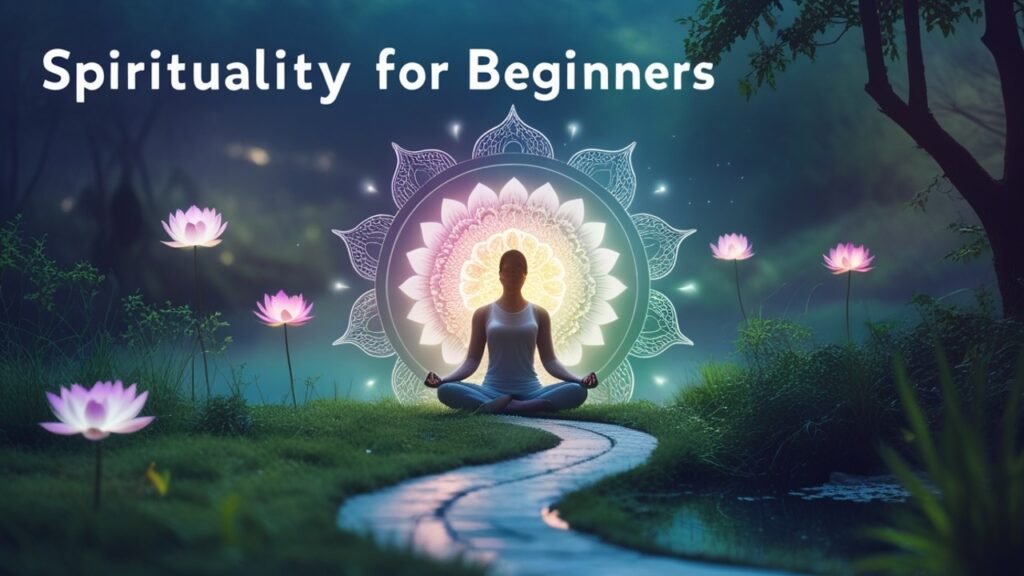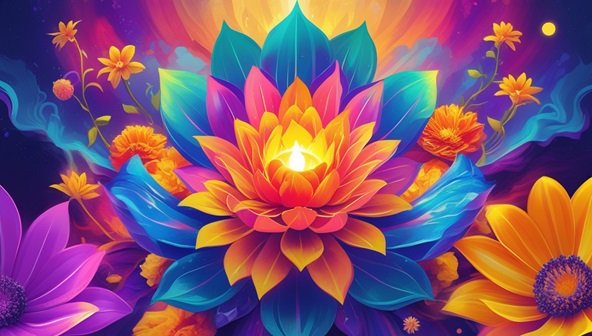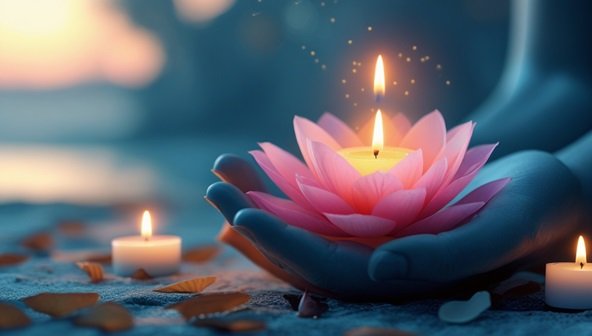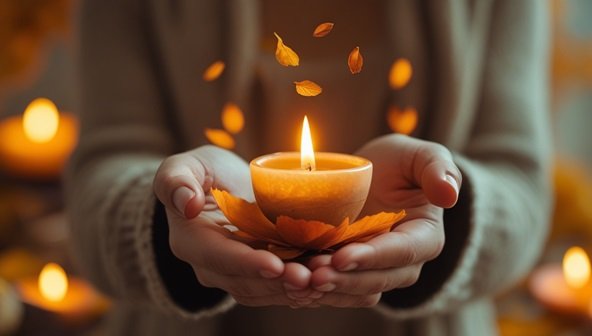Spirituality for Beginners: Your Guide to Starting the Journey

Spirituality is the journey of connecting with yourself and the world around you in a deeper way.
It is not just about religion, it is about finding inner peace, purpose, and understanding life beyond the everyday.
For beginners, starting this journey might feel confusing, but it does not have to be.
Spirituality can help you feel calm, discover who you truly are, and build a stronger sense of happiness.
Imagine a life where stress feels smaller, and you find joy in little things every day. Does this sound like something you want?
This guide will show you simple steps to begin your spiritual journey, even if you have no experience.
Whether it is through meditation, journaling, or just taking time to be mindful, you can create a path that feels right for you.
Let us begin exploring the world of spirituality for beginners.
- What Is Spirituality?
- Spirituality for Beginners
- Enhanced sense of purpose and self-awareness
- Why Start Your Spiritual Journey?
- Steps to Begin Your Spiritual Journey
- Connecting With Nature to Rejuvenate the Soul
- Essential Practices for Beginners
- Understanding and Using Spiritual Tools
- Avoiding Common Pitfalls
- How to Stay Consistent in Your Spiritual Practice
- Conclusion
- FAQ
What Is Spirituality?
Spirituality is the search for something greater than the material world. It is about exploring the deeper meaning of life and finding a sense of balance and harmony.
Spirituality invites you to reflect on your values, beliefs, and actions, helping you build a stronger connection with yourself and the world around you.
It is not limited to any specific practice, instead, it is a journey that looks different for every person.
Whether it is through quiet meditation, appreciating nature, or simply being kind to others, spirituality encourages personal growth and self-discovery.
It is about looking within, understanding your place in the world, and living a life that feels meaningful.
Spirituality for Beginners
Embarking on a spiritual journey can be a life-changing experience, filled with self-discovery, inner peace, and a deeper connection to the world around you.
Spirituality for Beginners is your comprehensive guide to taking those first steps towards spiritual awakening.
Whether you’re seeking to understand the basics of meditation, explore mindfulness practices, or simply find a sense of purpose and meaning in your life, this guide offers practical advice and insights.
But what exactly is spirituality, and how does it differ from religion?
In the next section, we’ll delve into the concept of spirituality, exploring its broad and inclusive nature that goes beyond traditional religious boundaries.
Join countless others who have found solace and transformation through spirituality, and start your journey to a more enlightened and peaceful existence today.
Defining Spirituality: Beyond Religion
Spirituality is about discovering a deeper connection with yourself, others, and the world around you.
It is not tied to any specific religion or belief system. Instead, it focuses on understanding life’s meaning and finding inner peace.
While some people may explore spirituality through prayer or faith, it is also about personal growth, kindness, and living in harmony with nature and your surroundings.
At its heart, spirituality is a personal journey. It encourages you to look within and find what makes your life meaningful.
Whether it is through meditation, mindfulness, or simply being present, spirituality helps you feel more grounded and connected to the world.
Benefits of Embracing a Spiritual Path
Choosing to walk a spiritual path can bring many positive changes to your life. It is not just about feeling calm but also about building inner strength and clarity.

When you practice spirituality, you nurture a deeper connection with yourself and your surroundings, which often leads to a happier and more fulfilling life.
Improved mental health and emotional resilience
Spiritual practices like meditation, mindfulness, or journaling can reduce stress and help you feel more in control of your emotions.
By focusing on the present moment and understanding your inner thoughts, you can build a stronger ability to cope with life’s challenges.
This resilience allows you to recover quickly from setbacks and maintain a sense of peace, even during tough times.
Enhanced sense of purpose and self-awareness
Spirituality helps you uncover what truly matters to you. It can guide you toward setting meaningful goals and making decisions that align with your values.
When you explore your inner self, you gain clarity about who you are and what brings you joy.
This sense of purpose not only boosts your confidence but also helps you lead a more intentional and satisfying life.
By embracing spirituality, you are opening the door to self-growth and harmony, creating a foundation for long-term happiness and personal fulfilment.
Why Start Your Spiritual Journey?
Starting your spiritual journey can be one of the most meaningful decisions you make.
It is an opportunity to explore who you are, understand your emotions, and build a stronger connection with the world around you.
Spirituality helps you step away from the busyness of life and focus on what truly matters.
Whether you are looking for peace, purpose, or strength to overcome challenges, spirituality provides a path to self-discovery and growth.
Recognizing the Call for Inner Peace and Connection
Life can often feel noisy and overwhelming. Many of us find ourselves longing for a sense of calm and balance.

This inner desire for peace is the first step toward starting a spiritual journey. It is about understanding that life is more than just work, responsibilities, or chasing material goals.
When you start listening to this call, you begin to notice the little things that bring joy, like the beauty of nature, quiet moments, or meaningful conversations.
Spirituality helps you deepen this connection, both with yourself and the people around you.
It is a reminder that you are a part of something bigger, and that realization can bring immense comfort and harmony.
Overcoming Life’s Challenges Through Spiritual Practices
Life is full of ups and downs, and it is easy to feel lost during difficult times. Spiritual practices like meditation, mindfulness, or journaling can provide a sense of stability and hope.
These practices teach you how to focus on the present moment instead of worrying about the past or future.

Specifications
- Step-by-Step Manifestation Blueprint
- Personalized for Your Success
- Proven Law of Attraction Strategies
- Designed for Busy Lives
- Money-Back Guarantee
When challenges arise, spirituality can guide you to look within for strength and clarity. It helps you respond to problems calmly instead of reacting with stress or fear.
Over time, these practices build resilience, making it easier to face life’s difficulties with courage and a positive mindset.
By starting your spiritual journey, you are giving yourself the tools to not only handle challenges but also to grow from them.
It is a way to find light even in the darkest moments, helping you move forward with hope and confidence.
Steps to Begin Your Spiritual Journey
Starting your spiritual journey is an exciting and personal process. There is no one-size-fits-all approach, as spirituality looks different for everyone.
The key is to take small, meaningful steps that feel right for you. These steps can help you build a stronger connection with yourself and the world around you.
Treating Your Journey as a Personal Experience
Your spiritual journey is unique to you. It is not about following strict rules or comparing yourself to others.
Instead, it is about discovering what makes you feel peaceful and fulfilled. Take time to explore different practices and ideas.
What works for one person may not work for another, and that is okay. The beauty of spirituality is that it allows you to create a path that fits your life and values.
Practicing Gratitude and Mindfulness Daily
Gratitude and mindfulness are simple but powerful practices to start your journey. Begin each day by thinking about three things you are thankful for, no matter how small.
This helps shift your focus to the positive aspects of your life.

Mindfulness, on the other hand, is about being present in the moment. Instead of worrying about the past or future, pay attention to what is happening right now.
This could be enjoying your morning coffee or feeling the breeze on your skin. Practicing gratitude and mindfulness every day can bring more peace and happiness into your life.
Journaling for Clarity and Reflection
Writing in a journal is a great way to understand your thoughts and emotions. Set aside a few minutes each day to write about how you feel, what you are grateful for, or any questions you have about life.
Journaling can help you discover patterns in your thinking and give you clarity on what matters most to you.
Over time, it becomes a safe space where you can reflect, grow, and track your spiritual progress.
Exploring Meditation and Yoga
Meditation and yoga are excellent tools to calm your mind and connect with your inner self.
Meditation involves sitting quietly and focusing on your breath, a mantra, or even a peaceful sound.
It helps reduce stress and brings a sense of inner peace.
Yoga combines movement with mindfulness. It allows you to stretch your body, relax your mind, and release tension.
Both practices can help you feel more balanced and centered, making them perfect for beginners on a spiritual journey.
Connecting With Nature to Rejuvenate the Soul
Nature has a special way of making us feel calm and connected. Spending time outdoors, whether it is walking in a park, sitting under a tree, or listening to birds, can refresh your mind and uplift your spirit.
When you connect with nature, you become more aware of the beauty and harmony around you.
This sense of connection can inspire feelings of gratitude and peace. Make it a habit to spend a few moments in nature every day and notice how it helps you feel grounded and renewed.
By taking these simple steps, you can gently begin your spiritual journey and create a life filled with meaning, balance, and joy.
Essential Practices for Beginners
Spiritual practices can guide you to a more balanced and meaningful life. For beginners, exploring simple and accessible methods is a great way to start.
Total Money Magnetism

- Millionaire Mindset Training
- Scientifically Proven Techniques
- Step-by-Step Wealth Building
- Comprehensive System
- Designed for All
- Money-Back Guarantee
These practices can help you connect with your inner self and create a deeper sense of peace and harmony.
Chakra Healing and Energy Balancing
Chakras are energy centers in the body, and many believe they play a key role in our emotional, physical, and spiritual well-being.
When your chakras are balanced, you may feel calm, energized, and more connected to yourself.
Begin by learning about the seven main chakras, starting from the base of your spine to the top of your head.
You can practice balancing them through visualization, meditation, or yoga. For example, focusing on a specific color, like red for the root chakra, can help restore its energy.
Simple breathing exercises and affirmations can also aid in clearing blocked energy, allowing you to feel more aligned and centered.
Understanding and Using Spiritual Tools
Spiritual tools like crystals, incense, and essential oils are used by many to enhance their spiritual practices.
These tools can create a calming atmosphere and help you focus on your intentions.
Crystals, such as amethyst or rose quartz, are believed to carry unique energies that promote healing and balance.
You can keep them near you or hold them while meditating. Burning incense, like sandalwood or sage, is thought to clear negative energy and invite peace into your space.
Essential oils, like lavender or frankincense, can be diffused or applied gently to your skin to create a relaxing and uplifting environment.
These tools are not magical on their own, but they can act as reminders to stay present and intentional in your spiritual journey.
Cultivating Creativity as a Spiritual Outlet
Creativity is a powerful way to connect with your spirit and express your true self. Whether it is painting, writing, dancing, or even cooking, creative activities allow you to explore your inner thoughts and emotions.
You do not have to be an artist to enjoy creativity. The act of creating something, no matter how small, can bring a sense of joy and accomplishment.
It is about letting go of judgment and allowing your ideas to flow freely.
Spending time on creative outlets can also serve as a form of meditation. When you lose yourself in an activity you love, you often feel more relaxed and in tune with your inner self.
Over time, this can deepen your connection with your spirituality and add more joy to your daily life.
By exploring these practices, you can take meaningful steps toward understanding yourself and nurturing your spiritual growth.
Avoiding Common Pitfalls
Starting a spiritual journey is a rewarding experience, but it can also feel confusing at times. Beginners often face challenges or make mistakes that slow their progress.
Understanding these pitfalls and learning how to avoid them will make your journey smoother and more meaningful.
Mistakes to Avoid as a Beginner
Starting your spiritual journey can be exciting, but it’s easy to make mistakes along the way.
Many beginners rush the process, get lost in complicated rituals, or depend too much on others for guidance.
These can slow your progress and make the journey feel overwhelming.
The key is to move at your own pace, simplify your practices, and trust your own experiences.
Let’s look at some common mistakes and how to avoid them, so your journey remains focused and rewarding.
- Trying to Rush the Process
Spiritual growth takes time. It is natural to feel excited when you begin, but expecting instant results can lead to frustration. Instead of rushing, focus on small, daily practices. Growth happens gradually, and each step is important. - Relying Too Much on Others
While it is helpful to learn from teachers, books, or videos, your spiritual journey is personal. Avoid depending solely on others to guide you. Take time to reflect on your own experiences and feelings to discover what works best for you. - Overcomplicating the Journey
It is easy to get caught up in complex ideas or rituals. However, spirituality is about simplicity and connection. Start with practices that feel natural, like meditation, journaling, or gratitude. Over time, you can explore deeper concepts as you grow.
Balancing Skepticism with Openness
It is normal to feel skeptical when exploring something new, especially in spirituality.
Questioning what you learn is healthy and helps you make informed choices. However, too much skepticism can close you off to valuable experiences.
To find balance, approach new ideas with curiosity and an open mind. If something feels unfamiliar or hard to believe, take your time to explore it.
Practice it if it feels right, and trust your intuition to guide you.
Remember, spirituality is not about blindly following others. It is about finding what resonates with you.
By staying open and grounded, you can grow at your own pace and build a spiritual path that truly fits your life.
Avoiding these common pitfalls will help you stay focused and enjoy the journey, making it a fulfilling and empowering experience.
How to Stay Consistent in Your Spiritual Practice
Staying consistent in your spiritual practice can be challenging, especially when life gets busy.
However, consistency is key to deepening your spiritual journey and reaping the full benefits.
By creating a routine and tracking your progress, you can keep your practice on track and continue growing. Here are some simple ways to stay consistent.
Establishing Daily Rituals
One of the best ways to stay consistent is by establishing daily rituals that fit naturally into your life.
These rituals can be as simple as a few minutes of meditation, journaling, or practicing gratitude.
The goal is to make them a regular part of your day, just like eating or brushing your teeth.
Start small and choose practices that feel meaningful to you.
If you feel drawn to morning meditation, set aside 5-10 minutes each morning to sit in silence. If journaling works better for you, write for a few minutes before bed.
Having a daily ritual creates a sense of routine and helps you stay connected to your spiritual path.
Tracking Your Progress and Growth Over Time
Another way to stay consistent is by tracking your progress. Keeping a journal or log of your spiritual practices allows you to see how much you have grown over time.
You can write down how you feel after your daily practices or any new insights you discover.
Looking back at your progress can be a powerful reminder of how far you have come and can motivate you to continue.
It also helps you identify what is working best for you and areas where you may want to improve.
Tracking your growth makes your spiritual journey more personal and rewarding.
By building daily rituals and tracking your progress, you can stay consistent and keep growing on your spiritual path.
Conclusion
Starting your spiritual journey is a wonderful experience that can bring more peace, purpose, and clarity into your life. By taking small steps like setting daily rituals, practicing mindfulness, and using spiritual tools, you can deepen your connection with yourself and the world around you. Remember, the key is to move at your own pace and be patient with yourself.
Avoid common mistakes by focusing on simplicity and staying open-minded. Track your progress and celebrate the small victories along the way. Most importantly, enjoy the process of discovering what brings you peace and joy.
Spirituality is a personal journey, and there is no right or wrong way to begin. With consistency and an open heart, you can continue to grow and find fulfilment in your spiritual practice every day.
FAQ
What is the best way to start a spiritual journey?
Start small with practices like meditation, gratitude, or journaling. Build daily rituals and explore what feels right for you. Consistency is key.
How long does it take to see the benefits of spirituality?
Benefits start to appear in a few weeks, but deeper changes like emotional resilience can take months or years. Patience is essential.
Can I practice spirituality without following a religion?
Yes, spirituality is personal and does not require following a specific religion. Practices like meditation, mindfulness, and creativity are great alternatives.
How can I stay consistent in my spiritual practice?
Set simple daily rituals, track your progress, and celebrate small victories. Consistency and tracking growth help you stay motivated.



